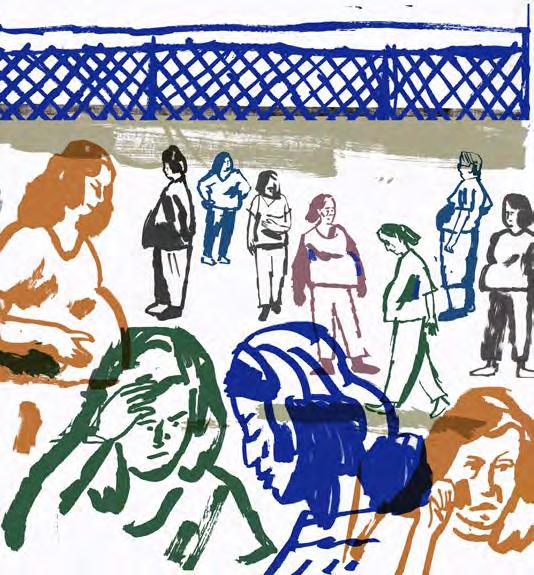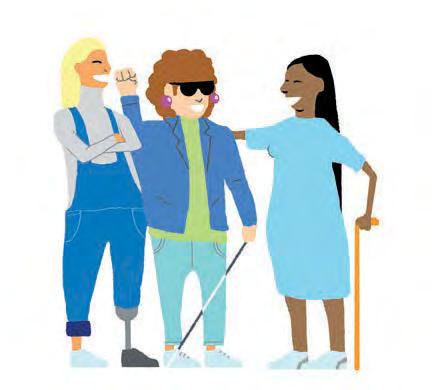
8 minute read
Release on temporary licence experiences
ROTL experiences
Illustration: JB
Advertisement
Release on Temporary License (ROTL) is an important stepping-stone to help you prepare for release from prison, but you are not alone if the thought of it is also a little overwhelming. We spoke with four women who told us all about their ROTL experiences, including how to make the most of your time outside prison and how to secure a placement in the first place.
Karen, Project Worker at Women in Prison
ROTL is exactly what it says on the tin: you are released temporarily and given a piece of paper that you must guard with your life, as it contains all of your conditions and timing requirements.
I went out on ROTL regularly once I had completed my six-week risk assessment in prison. My first ROTL was a medical one from closed prison and I was accompanied by two officers. It didn’t matter that I was on my way to have two teeth extracted, I was hyped that I would be out in the real world for a few hours! As for my experience of town visits, the preparation I remember receiving was a walk through my licence, which stated the rules (e.g. no drinking alcohol, no drugs, no bringing anything back), a list of other prohibitions and the time I had to be back.
My first town visit was from 12 to 4pm, so we couldn’t do too much except go into town and have some lunch. Getting into my mum’s car was liberating and it felt so good to hug my son without having to keep my hands on a table. Everything was fine until we hit the shopping centre. There were people everywhere; I clammed up, my head went light, and things around me seemed really quiet and slow. I struggled to relax, and I didn’t know what to do or how to act. People in the restaurant were politely asking me what I would like to eat. It was all a huge shock just to be treated like a dignified human again.
This treatment was short lived; upon my return to prison, I was the random mandatory strip search for that day, which is probably one of the most degrading aspects of prison life. While it’s painful being apart from your former life, it’s important to remember that one day it’ll be back, so until then, you do you, and create a better version of yourself so you are ready.
ROTL got easier. I developed a thick skin whenever I entered the prison grounds. From one world to another, deep breath in, here we go again. In the end, I was out on a town visit every two weeks, I applied for primary carer leave every six weeks, which was a Friday to Monday stay with my son, and I was at university for three and a half days each week. Without my ROTL experiences, it would have been much harder to face my release date.
My advice to those preparing for ROTL: prepare your clothes the night before, get everything organised, and take some quiet time before you leave. Most things become easier when you repeat them enough times. Talk to a friend inside and find out what their first time out was like. And remember what you are doing it for; this is what helps you get to the end. Don’t stop believing, you can get through it all.

Jeanette, Store Manager at Greggs
I worked on ROTL for the food retailer Greggs, starting as a team member. At the beginning, my job involved cash handling, food safety, and customer care. Since leaving prison, I have been promoted over the years and I am now a store manager.
The most enjoyable part for me was knowing that once I had completed my training I would have a job. This meant that I could avoid the benefit trap. I was worried about being homeless upon release. How would I find accommodation? And how would I get to work? But having a job allowed me to save money so I was ready to find my own place.
My advice for anyone going on ROTL is to get as much help and support as you need. If you are able to work, save as much money as you can. It will help you to support yourself and sustain your living costs until your work payments come through. Knowing that you have some money to look after yourself will also prevent you from making wrong choices. Just concentrate on your employment and preparing for life on release. Sticking to this meant that I didn’t have to worry when I was released and I could concentrate on working.
Before going on ROTL, take every course or opportunity in prison that you can to prepare you for a job. ROTL can be exciting and challenging at times – I was really nervous at first because I had been in prison for a long time. But you have to be practical: avoid people from your past and keep focused on your goals. You have to take care of yourself and your decisions first; just one mistake can take you off course. Also, plan everything including your journey to and from work, what you are going to do when you get to work, as well as making sure you have the phone numbers of those you can call if anything goes wrong (e.g. if a bus is running late or you couldn’t leave the prison on time). Stay organised and focused on the end goal.

Nikki, Trainee Commis Chef
Once I was ‘ROTL ready’ (i.e. no longer being escorted), I worked at the visitor centres at Downview prison and High Down prison on a voluntary basis. This prepared me for paid employment.
I now work at a hotel in the kitchen, training as a commis chef (a junior chef), using the qualifications I gained from prison. My responsibilities include food prep, cook-to-order and supervising the kitchen porters. I am really enjoying it and I aim to keep progressing so that I can continue working at the hotel.
It does feel like barriers are put in front of you all the time, so my advice is to think about how you can achieve what you want. Whether this means going over or around the barriers you face, there’s always a way. For my ROTL placement, I had to do the groundwork myself and then submit a proposal to the officers. Make sure you are always where you should be, as this will gain you further and future trust on ROTL – at this point, I am now only in the prison for 5 days each month. It’s hard work and my advice is: don’t give up and always keep your goals in sight!
*What is Smart Works?
Smart Works is a UK charity that provides high-quality interview clothes and interview training to women in need. Appointments are made on a referral basis, including through Working Chance, Solace Women’s Aid and HM Prison Service. For more information about their services, visit their website on www.smartworks.
Jenny, Charity Volunteer
I currently work as a volunteer for a prison reform charity. I support the Advice and Information team, clearing the data on their database to make it easier for the team when taking calls from those in prison. I also collate data from surveys and carry out ad hoc administrative tasks.
I enjoy the experience immensely because I get to spend time with different people and experience the normal day-to-day routine of going to work, which I had really missed. This particular role allows me to have a positive impact on the prison estate too, which is very important to me.
The biggest challenge when working outside of prison is that you aren’t really a part of that world anymore, but you also aren’t part of the ‘real’ world yet, so you have to find a new place for yourself. My advice for anyone reading this is to be proactive: do not rely on the prison to find work for you – they won’t. Make sure you have alternative travel routes planned because commuting can be a challenge at times. And just because you are a prisoner, it doesn’t mean that you don’t have the same employment rights as everyone else; if something strikes you as wrong when in your workplace, flag it with someone.

My advice for anyone going on ROTL is:
It’s natural for you to feel tired at first. It takes a while to get used to being out and about so much again, but don’t give up!
Take up the prison’s offer to provide lunch – don’t spend your money if you don’t have to.
If you are a nervous/impatient traveller, find something to entertain you on your commute, like a book or a magazine.
No one is staring at you; they are far too busy going about their own day.
Find out the dress code for where you are going. If you don’t have appropriate clothing, places like Smart Works* can help out. You shouldn’t have to feel like you don’t fit in. Enjoy it! Work really can be fun.
For more information on ROTL, please write to the Prisoners’ Advice Service (PAS) to request their self-help toolkit at Prisoners’ Advice Service, PO Box 46199, London, EC1M 9XA. Please mark your envelope with ‘Legal Mail Rule 39’ in all correspondence with PAS.










